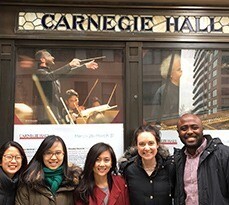Cambridge MBAs advise Carnegie Hall in New York how to entice more single ticket buyers to return for other concerts by making the venue more accessible to musical novices.
According to an old joke: a person carrying a violin case in New York City asks a stranger “how do I get to Carnegie Hall?” and the stranger earnestly replies: “practice, practice, practice.”
Administrators at the stately 127-year-old performing arts hall posed a different question to a team of MBA students from Cambridge Judge Business School: not how people can get to Carnegie Hall for the first time, but how can Carnegie Hall entice single ticket buyers (STBs) to return to the venue for other concerts.
“Single ticket buyers are a significant portion of our revenue, but they’re much harder to develop a relationship with” compared to subscribers and other regular customers, says Sara Villagio, Chief Marketing Officer at Carnegie Hall. “It costs an arts organisation more to acquire single ticket buyers, so we want to invest in creating an ongoing relationship once we have their attention.”

So the five-member team at Cambridge Judge (all Cambridge MBA 2017) looked this spring into the issue of “churn” among Carnegie Hall STBs for their Global Consulting Project, an MBA initiative in which a team of students work closely with a sponsoring organisation to develop solutions to a business problem or issue.
Churn is an issue throughout arts organisations, and the current churn rate for STBs at Carnegie Hall is about 80% – meaning that four of five STBs do not return at all in the following year, a rate similar to the Hall’s peers. STBs tend to be younger, less wealthy, and less musically knowledgeable than subscribers.
“Carnegie Hall is doing a lot of things right – it’s world-renowned – but just getting an additional five percent of single ticket buyers to come back would make a huge difference, several hundred thousand dollars a year in revenue,” says Isabel Siragusa, a member of the MBA team who has an arts background herself as an actress. “Some of our recommendations are fairly easy to implement.”
Carnegie Hall has divided the MBA report’s recommendations by category, and assigned a team leader to evaluate each one. “We had looked before at different pieces related to single ticket buyers, but this was the first time we’ve examined it in such a holistic way,” says Sara Villagio.
The MBA team’s report to Carnegie Hall found that “while the artistic quality of Carnegie Hall is unmatched, the overall experience can still be improved through the customer journey.”
Through a survey, the team found that STBs most likely to churn are those who are new to both the hall and the music. So many of the recommendations focus on ways to make the Carnegie Hall experience more accessible to novices: encouraging customers to use a special telephone line that offers advice on musical programmes; identifying first-timers with a special notation on their tickets so ushers can better instruct them so they feel welcomed; and considering how to label ticket brochures in a different way since many novice concert-goers know the music of famous pieces (such as Rossini’s “William Tell Overture” and Beethoven’s “Ode to Joy”) but not the works’ names.
“First impressions matter a lot,” says Hai Ly Nguyen, another member of the MBA team. “The report focuses on ways to make it more compelling for customers to come back a second time. But we acknowledge that there’s a tension between an iconic brand and catering to a younger audience.”
For example, the MBA team suggested that Carnegie Hall could better inform novices about the etiquette of concert-going, such as when (and when not) to clap and what (or what not) to wear. The Carnegie Hall website says that there is “no specific dress code, so you might see a variety of attire” and that people unsure of when to applaud might well “follow the lead of other audience members.” The Cambridge MBA students believe that making these instructions more specific could “remove uncertainties for customers,” says Arisa Kure, another member of the MBA team.
One issue highlighted in the MBA team’s report is the especially high level of competition in the arts in New York. The team’s survey found that 31% of customers said they hadn’t repurchased tickets for Carnegie Hall events because they were looking at other venues.
The team also noted that STBs tend to be more fussy about physical comfort, compared to regular arts patrons who are accustomed to small balcony seats and cramped lobbies in historic venues. The MBA team’s report acknowledged that physical issues cannot be quickly changed in such a landmark building, but recommended more mobile ticketing and diverting customers away from the more congested box office area.
The Cambridge MBA team spent several weeks in March and April at Carnegie Hall, located at 57th Street and Seventh Avenue in midtown Manhattan. The Global Consulting Project included analysis of focus groups, historical data, phone interviews with STBs and subscribers, interviews with Carnegie Hall staff across departments, and a survey of several hundred Carnegie Hall STBs.
The full MBA team was comprised of: Oladele Olafuyi, Siling Tan, Isabel Siragusa, Haily Nguyen and Arisa Kure – who come from different backgrounds and five different countries (Nigeria, Singapore, the US, Vietnam and Japan).
“They were ideal to work on something like this because they could take on the perspective of a first-time buyer,” Sara Villagio says of the MBA team. “The students could start from the outside and look in, and this allowed them to hit on the details that they did.”


